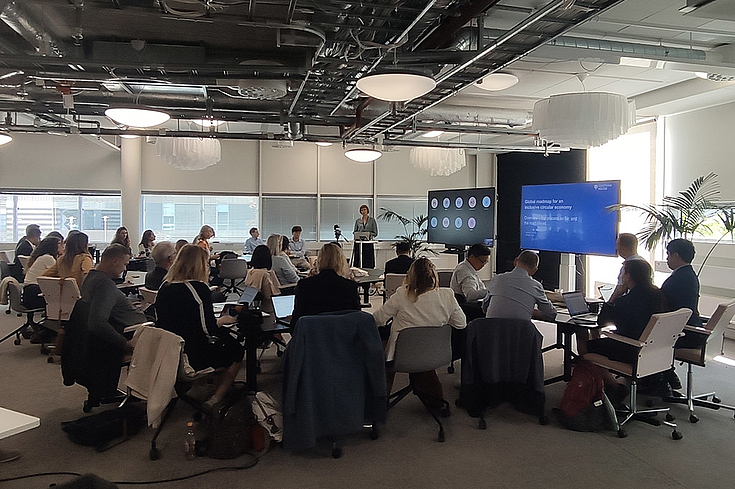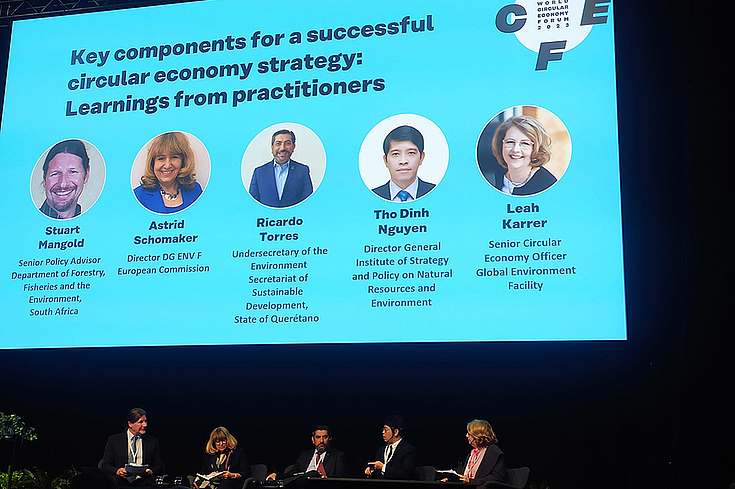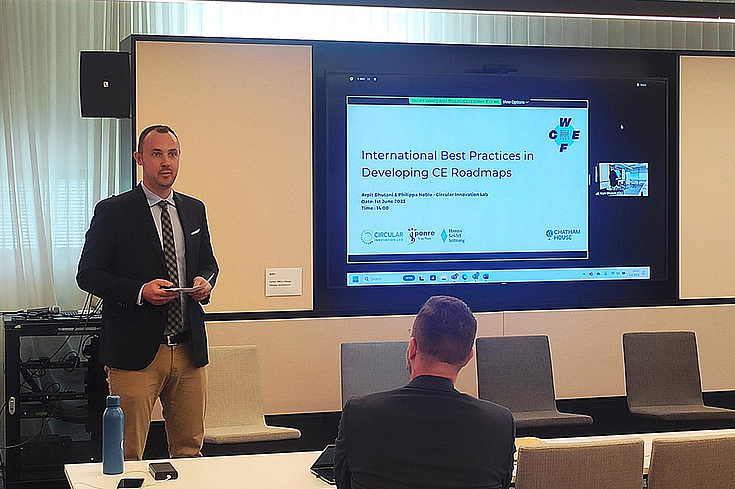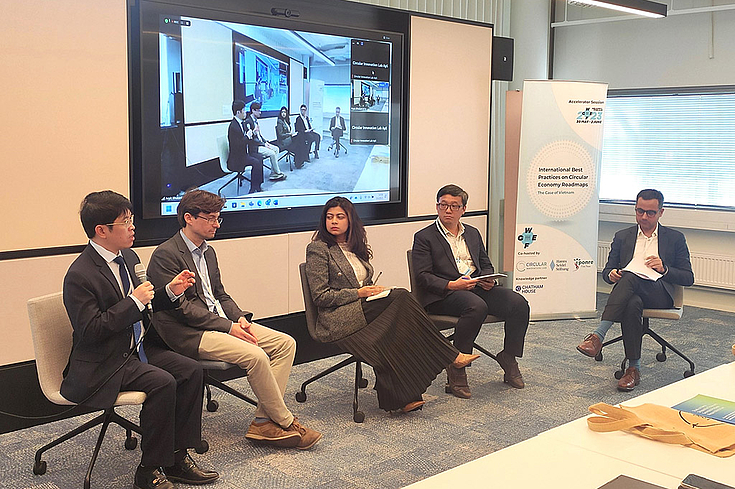HSF Vietnam is part of the World Circular Economy Forum 2023 (WCEF 2023)
Vietnamese Delegation Visit at WCEF 2023 in Helsinki, Finland
Round table discussion on Global Circular Economy Roadmap Initiative
HSF
Roundtable discussion on the Global Circular Economy Roadmap Initiative
On the first day of the delegation visit, the Vietnamese delegation led by Assoc Prof Nguyen Dinh Tho – Director General of ISPONRE – had the opportunity to discuss with representatives of international organisations and governments at the Global Circular Economy Roadmap Initiative – Helsinki Planning Workshop. This initiative, launched officially at the World Circular Economy Forum in Kigali in December 2022, closely aligns with the objectives of the Global Strategy on Sustainable Consumption and Production 2023-2030, adopted by Member States and stakeholders in October 2022. The round table discussion became a forum for sharing Vietnam's experiences and lessons in the development of a circular economy roadmap, contributing the national perspective to the international dialogue. The insightful exchange provided a global perspective that included comprehensive insights from other countries in Latin America, Africa, and Eastern Europe. The group discussions, facilitated by representatives from various international stakeholders delved into diverse topics, encompassing circular economy financing roadmaps, visioning processes, and methodological planning for further global development. This vibrant engagement not only showcased Vietnam's progress but also fostered a collaborative exploration of strategies and methodologies shaping the global circular economy landscape.
Assoc Prof Nguyen Dinh Tho spoke at the session on Circular Economy strategy.
HSF
The World Circular Economy Forum 2023
The Forum, held in Helsinki, united a global audience to share circular economy solutions benefiting both nature and the economy. Key levers highlighted included enhancing collaboration, leveraging finance and policy, regenerating land, prioritizing human well-being, and rethinking consumption and business practices. With 151 speakers across 20 sessions and an Expo showcasing solutions from over 50 organizations, the event emphasized the importance of circular economy roadmaps and strategies. The Vietnamese delegation, led by Assoc Prof Dr Nguyen Dinh Tho, Director General of ISPONRE (MoNRE), participated in the WCEF 2023, contributing insights and engaging in discussions on the country's commitment to circular economy principles. The delegation explored a diverse range of sessions covering finance, health, future skills, and various industry sectors, gaining inspiration from global perspectives and sharing Vietnam's experiences. Of particular significance was the panel discussion where Assoc Prof Dr Nguyen Dinh Tho detailed Vietnam's current ambitions and the forthcoming National Action Plan on Circular Economy. This engagement showcased Vietnam's commitments in the global transition to a circular economy and its commitment to sustainable and innovative practices. HSF Vietnam provides support to the development process of this important policy framework.
Mr Michael Siegner, Resident Representative of HSF Vietnam, presented the session to audiences.
HSF
Accelerator Session: International Best Practices on Circular Economy Roadmaps: the Case of Vietnam
On June 1st, 2023, the Accelerator Session during WCEF 2023 titled 'International Best Practices on Circular Economy Roadmaps: The Case of Vietnam' was hosted by the Circular Innovation Lab, Hanns Seidel Foundation Vietnam, and the Institute of Strategy and Policy on Natural Resources and Environment of Vietnam (ISPONRE), with Chatham House as a knowledge Partner. This session delved into global best practices concerning the development of Circular Economy Roadmaps/Action Plans, providing valuable insights for nations at various development stages of their circular economy journey. The focal point was Vietnam's ongoing transition towards a circular economy, with a spotlight on its Circular Economy National Action Plan. The session aimed to share the experiences and lessons from Vietnam, while also informing Vietnam’s own CE development process.
In the discussions led by Assoc. Prof. Dr. Nguyen Dinh Tho, Director General of the Institute of Strategy and Policy on Natural Resources and Environment of Vietnam (ISPONRE), Vietnam's dedication to environmental preservation, climate change mitigation, and biodiversity conservation took center stage. Key criteria of Vietnam's circular economy law were elucidated, emphasizing efficient resource utilization, extending product lifespan, reducing CO2 emissions and waste, and averting adverse environmental impacts. The national plan is laser-focused on achieving zero waste and carbon neutrality by 2050, coupled with a commitment to halt biodiversity loss. Taking a global perspective, Arpit Bhutani, COO of Circular Innovation Lab, presented international best practices in developing Circular Economy Roadmaps, emphasizing societal involvement, regular progress assessments, stakeholder engagement, and relevant circularity metrics as vital components.
Panel Discussion with CE experts from Vietnam, England, and India
HSF
The second part of the session featured a panel discussion with insights from experts. Apoorva Arya, CEO of Circular Innovation Lab, stressed the significance of early and inclusive stakeholder engagement, along with setting specific targets, robust progress metrics, and legislative integration. Dr. Patrick Schröder, Senior Research Fellow at Chatham House, highlighted the need for developing basic metrics, including considerations for employment and just transitions. Assoc. Prof. Dr. Nguyen Dinh Tho discussed challenges in the Vietnamese context, including accounting, auditing, financing, technology, and the delicate balance between economic development and sustainability. Dr. Nguyen Hong Quan, Director of the Institute of Circular Economy Development at the Vietnam National University, emphasized the need for flexibility and decentralization in adapting Circular Economy Roadmaps to diverse regional contexts. The session underscored the importance of collaboration, robust metrics, societal involvement, decentralization, and regular reviews in roadmap development, tailored to unique national contexts. Education's pivotal role in fostering circular economy understanding and the potential of international cooperation for funding and expertise were acknowledged, concluding that transitioning to a circular economy requires comprehensive efforts across societal layers and sectors, constituting a broad societal transformation.




